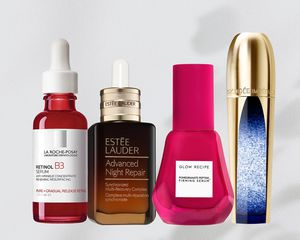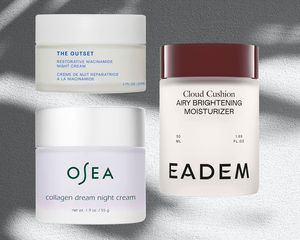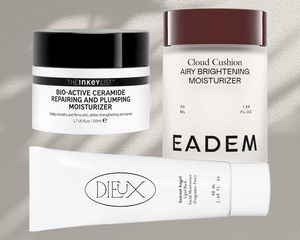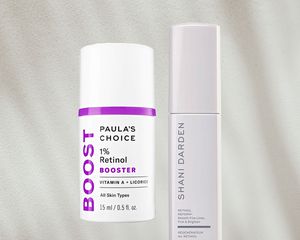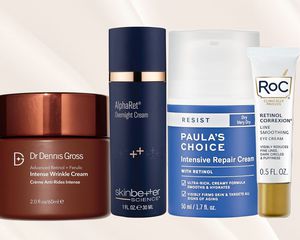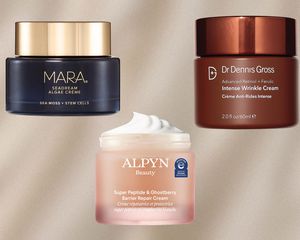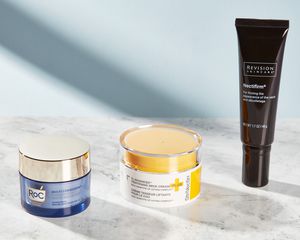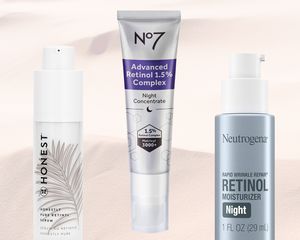:max_bytes(150000):strip_icc()/bakuchiol-94e95b7a235942d0bb49825b1c25d80c.png)
Stocksy
In This Article
If you're looking for an ingredient that can give you the glowy skin of your dreams, retinoids should probably going to be your first choice. The skin-sloughing ingredient is heralded as dermatologists' go-to for anti-aging and even acne-fighting. But, as they say, all great things come with a price, and with retinoids, that can equal dry, irritated, flaky, and red skin.
And that's where bakuchiol comes in. This powerful, plant-based ingredient is touted as the natural version of retinol and is gaining popularity‚ especially among those with sensitive skin.
We asked dermatologists, Rachel Nazarian and Jennifer Chwalek, along with cosmetic chemist, Vanessa Thomas, about the benefits and side effects of bakuchiol to see how it really holds up to our favorite retinoids. Keep reading for what they have to say about the sensitive skin-loving ingredient.
Meet the Expert
- Rachel Nazarian, MD, is a board-certified dermatologist at New York's Schweiger Dermatology Group.
- Jennifer Chwalek, MD, is a board-certified dermatologist at UnionDerm in New York City.
- Vanessa Thomas is a senior cosmetic chemist and CEO of Freelance Formulations.
What Is Bakuchiol?
Bakuchiol (pronounced buh-koo-chee-owl) is an extract derived from the leaves and seeds of the babchi plant. It’s an herb commonly used in Ayurvedic and Chinese medicines, as well as Tamil Siddha practices, to help heal, calm, and soothe the skin, thanks to its anti-inflammatory and antibacterial properties. According to Dr. Nazarian, some of the substances from the plant are already used to treat conditions like vitiligo, but using bakuchiol from the plant is a rather recent practice.
Bakuchiol
Type of ingredient: Hydrator
Main benefits: Wrinkle reduction, increases skin firmness, and reduces the appearance of pores.
Who should use it: Generally, bakuchiol is safe for all skin types.
How often can you use it: It's safe to use twice a day, in the morning before moisturizer and at night before any serums.
Works well with: Other hydrating ingredients, like squalane and PHAs.
Don't use with: Glycolic acid might degrade the formulation.
Benefits of Bakuchiol for Skin
According to a study in The British Journal of Dermatology, after 12 weeks, individuals treated with bakuchiol saw major improvements in wrinkles, pigmentation, elasticity, and photodamage overall. Thomas adds that, in addition to its anti-aging and anti-inflammatory properties, bakuchiol also enhances anti-acne properties.
- Evens skin tone: Bakuchiol deeply penetrates the skin to help lessen the appearance of dark spots or areas of hyperpigmentation.
- Reduces the appearance of fine lines: Like retinol, bakuchiol tells your cells to regenerate and make collagen, "plumping" your skin and reducing the look of lines and wrinkles.
- Doesn't cause dryness or irritation: While retinol and other skincare ingredients may dry out skin or cause irritation, bakuchiol is more gentle and isn't known to cause any irritation.
- Speeds up skin cell regeneration: Bakuchiol sends signals to your cells that it's time to amp up collagen production and cell turnover.
- Suitable for all skin types: Since it's gentle on the skin, almost anyone can use bakuchiol.
- Helps soothe and heal skin: By promoting cell turnover and healthy cell regeneration, bakuchiol may help soothe and heal your skin from the inside out.
Potential Side Effects of Bakuchiol
Thomas says that there are currently "no known studies that reflect any unwanted or negative side effects." While Dr. Nazarian concurs, she adds that it's still a relatively new product. "Because it is not retinol, it has the potential to be safe in pregnancy and breastfeeding," she says. It's always better to be safe than sorry, so she recommends waiting for more studies to come out to ensure bakuchiol's safe to use while pregnant or breastfeeding.
Bakuchiol vs. Retinol
Bakuchiol is not only as effective as retinol at targeting fine lines, wrinkles, and uneven skin tone; it’s also less irritating. In a 2019 study, no difference was found between retinol and bakuchiol in treating wrinkles and hyperpigmentation. The retinol users, though, did experience more skin dryness and stinging. "Much like a retinol, bakuchiol triggers the genetic pathway in skin cells to create several types of collagen that are useful in skin health and anti-aging," says Dr. Nazarian. However, it doesn't cause stubborn dryness or irritation. Plus, unlike retinol, which can make the skin more sensitive to the sun (always make sure to wear SPF during the day), bakuchiol may actually help to make skin less sensitive to the sun’s harmful rays.
"Other studies have also reported improvement in lines/wrinkles, pigmentation, elasticity, and firmness with bakuchiol," Dr. Chwalek adds.
How to Use Bakuchiol
As of now, the only way to use bakuchiol is to apply it topically as a serum or lotion. Similar to retinol, you can apply bakuchiol before your regular moisturizers or serums. Since it's less harsh than retinol, you can also use it in the morning and at night for maximum effectiveness. Even though it likely won't make your skin more sensitive to the sun, always remember to apply sunscreen afterward, if you use bakuchiol in the morning.
What makes bakuchiol even better? It isn't known to negatively interact with other skincare ingredients. "There are instances where you should avoid specific products when using a retinoid, such as exfoliators, toners, and benzoyl peroxide as they can cause irritation," Dr. Chwalek says. "However, due to bakuchiol’s natural composition, it’s safe to use with other products in your skincare regimen." She personally recommends Ole Henriksen's Goodnight Glow Retin-ALT Sleeping Creme.
Final Takeaway
If you're looking for all the skincare benefits of retinol, minus the irritation and possible purging, bakuchiol is a gentle and effective alternative. Its ability to deliver anti-aging, anti-inflammatory, and antibacterial benefits packs a serious punch for anyone who wants to treat fine lines, wrinkles, pigmentation, elasticity, and photodamage to the skin. Plus, it's equally effective during the day as it won't be compromised by sunlight (though you should still wear SPF) and has no negative interactions with other skincare ingredients. So feel free to layer away!
